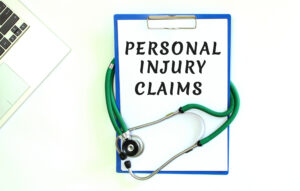After suffering an injury in an accident caused by someone else, you can quickly find yourself in desperate need of financial relief. Medical bills, inability to work, property damage, and other expenses can pile up and create a burden too heavy for you to bear. Waiting around for help may not be an option.
If you have suffered an injury in an accident and are looking for help, working with an experienced personal injury lawyer is your best chance to obtain the desired result. A successful personal injury settlement can provide the assistance and breathing room you need to start putting your life back together and moving forward. Continue reading below to learn more about how long personal injury cases take to settle, and contact a Bellingham personal injury lawyer today to schedule a consultation to discuss your case.
Overview of Personal Injury Cases

In a basic sense, personal injury cases happen when someone suffers physical harm due to the wrongful actions or negligence of someone else. Personal injury cases frequently arise from traffic accidents, slips and falls, workplace accidents, defective products, medical malpractice, and other incidents that leave people injured.
Victims of these accidents can file personal injury lawsuits to seek financial compensation for their medical bills, lost income, property damage, pain and suffering, and other expenses. Each personal injury case is unique, making it difficult to know what to expect in terms of timeline. While some cases may settle quickly, others may take months — or even years — to reach a resolution. Understanding more about personal injury cases and their timeline can be helpful as you begin the process.
Common Types of Personal Injury Cases
Personal injury cases can result from a wide variety of accidents, but there are some scenarios and incidents that more commonly lead to such cases. Some of the most common types of personal injury cases include:
- Traffic Accidents: Collisions involving cars, trucks, motorcycles, and other vehicles.
- Slip & Fall Accidents: Injuries caused by uneven terrain or unsafe property conditions.
- Workplace Injuries: Accidents that happen to people while working on the job.
- Product Liability: Defective or unsafe products can cause serious injuries.
- Medical Malpractice: Harm caused by negligence on the part of healthcare personnel.
Though each type of accident is different and presents its challenges, working with an experienced personal injury lawyer can put you on the right track to seek compensation.
Factors Influencing the Settlement Timeline
The amount of time it takes to settle a personal injury case depends on multiple factors, each carrying some level of influence over the timeline and how quickly things proceed. The specific details of your accident, the nature of your injuries, the number of parties involved, insurance company delays, and other legal issues can make the case more complex and complicate the settlement process. Knowing more about these factors and how to prepare for them can help you know what to expect as you and your lawyer build your case to seek a favorable resolution and fair financial compensation.
Complexity
The complexity of your personal injury case can significantly affect the timeline of reaching a settlement agreement. Cases involving multiple parties, most severe injuries, and disputes with various parties over who was at fault can muddy the waters and end up taking longer to resolve than more simple and straightforward cases. While relatively simple fender-bender accidents that cause minor injuries may settle quickly, cases involving corporate entities or catastrophic injuries can require more investigation and negotiation. Though complexity can make the settlement process take longer, working with a knowledgeable lawyer can provide you with the guidance to seek the outcome you want.
Establishing Liability
Proving liability is the crux of a personal injury case. Establishing that the party responsible for the accident caused your injury and resulted in the physical and financial harm you suffered is the most critical element of your case. It can affect the timeline of any settlement discussions. Simple cases involving two parties — a plaintiff and a defendant — can potentially reach a settlement on time, but if your case involves multiple at-fault parties that share responsibility (including companies in instances of commercial vehicle accidents, for example), establishing who was at fault for the accident may be far more complicated and time-consuming.
Medical Treatment
The severity of your injuries and the level and duration of medical treatment required can substantially impact the amount of time your personal injury case can take. In many cases, settlement negotiations will not begin until the injured person reaches what is referred to as the maximum medical improvement (MMI). This point is reached when the victim has recovered as fully as they can or until their long-term (or permanent) medical needs are established. This temporary delay may be necessary to ensure that all of your medical expenses (including future treatment) are included in the amount of compensation you are seeking.
Insurance Company Delays
Insurance providers frequently play significant roles in personal injury cases, often extending the timeline due to various delays in the claims process. Though insurers are often professional and helpful, it is not uncommon for these companies to prioritize their bottom line over the needs of injury victims. Pressuring claimants to accept low initial offers, delaying responses to communication attempts, disputing the severity of injuries, and other tactics can create significant delays in the settlement timeline. Though this is often frustrating to deal with, it is how the process works. Relying on your lawyer to handle all interactions with insurance companies can keep things on the right track.
Legal & Procedural Requirements
Time can also be added to the overall length of a personal injury case by some of the legal and procedural requirements involved in the process. Filing a lawsuit involves adhering to a strict process of specific deadlines and requiring complex paperwork. Courts in various jurisdictions can vary in the amount of backlog cases may confront once they enter the system. Scheduling hearings, conducting discovery, negotiations, and jury selection can also extend the timeline. All pre-trial steps can take time, so leaning on your attorney to explain the process and provide guidance through this phase will be helpful.
Stages of a Personal Injury Case

The timeline for settling a personal injury case is largely determined by the case’s progression through multiple vital stages. Each process step requires understanding various laws and regulations, paperwork, and preparation. By building a solid case and negotiating for fair compensation, your lawyer can move your case toward resolving disputes and seeking a favorable outcome. From your initial consultation with your attorney through the duration of the case, each step can vary in time depending on the specifics of your claim. The sections below will go into more detail about each of these critical phases.
Initial Consultation & Investigation
Your initial consultation with the attorney who will build your claim and represent you in legal proceedings will lay the foundation for your entire personal injury case. In this first step, your lawyer will work with you to understand the details of your accident and injuries, gather all available evidence to support your claim and identify all potentially liable parties. Collection of evidence and documentation is critical, as are witness testimonies and expert evaluation. Your lawyer will work to assess the full scope of your injuries and expenses, laying the groundwork to value your case in total as you prepare to seek compensation.
Demand Letter & Pre-Litigation Negotiations
After the detailed investigation into your claim has been completed and your case is accurately assessed, your lawyer will draft a document known as a demand letter and submit it to the at-fault party’s insurance company. The demand letter outlines the details of your claim, including describing the accident, establishing liability, and listing the amount of compensation you are seeking. The insurance provider may respond to the letter with a settlement offer, which will start the negotiating process. This stage can often determine whether a case can be resolved by reaching a settlement or proceeding to trial.
Filing the Lawsuit
If negotiations with the at-fault party’s insurance provider fail to result in a satisfactory outcome, the next step is filing a lawsuit. This action will formally initiate the legal process and require you and your lawyer to prepare a complaint detailing the claim and the amount you are seeking in damages. After filing a lawsuit, the at-fault party has a set period to respond, which may include contesting liability, your injuries, or the amount of compensation. It is important to note that filing a lawsuit does not automatically mean that your case will go to trial, as many cases still end up settling out of court before reaching that point.
Discovery Process
The discovery process is vital to any lawsuit, as it allows both sides to exchange information to build their cases. Each party will gather evidence, hold depositions with key people involved, and request documentation from the opposing side. Lawyers can question witnesses and ask to review medical records and other documentation related to the accident and your injuries. The discovery process can be lengthy, depending on the complexity of your case. Though it may be time-consuming, the discovery phase will allow your attorney to gather more information to strengthen your case. Trust your lawyer to use this process to put you in an advantageous position.
Settlement Negotiations or Mediation
Even after a lawsuit has been initiated, settlement negotiations can still take place, or mediation can be sought in an effort to reach a resolution without either party having to endure a lengthy and expensive court battle. Legal representatives for both sides can present their arguments and supportive evidence to negotiate a mutually agreed-upon settlement. Mediation offers a similar process but is supervised by a neutral third party who helps facilitate discussions. If each side seeks to bridge the negotiation gap and seek a compromise, a settlement agreement can be reached to satisfy both parties.
Trial & Post-Trial Stages
If all settlement negotiations prove to be unfruitful, your personal injury case will proceed to trial, where a judge or jury will determine its outcome. Both parties will present arguments, submit evidence, and question witnesses during the trial. This process can last for days, weeks, or months, depending on the specific details and complexity of the case. Even after a judge or jury reaches a verdict, the process can continue with post-trial appeals. The appeals process can last months or years as the court reviews the case. Though most personal injury cases end in settlements before going to trial, you and your lawyer need to be fully prepared for the possibility of a lengthy battle in court.
Why You Need an Attorney
After reading about the personal injury claim process in detail above, it should be obvious that having the guidance of a skilled attorney is vital. From the beginning of the process, with an initial consultation and investigation through the rest of the case — whether it involves a settlement or a trial — you owe it to yourself to put your case and its outcome in the hands of a highly trained legal professional.
Trust an Experienced Personal Injury Lawyer for Help

The immediate aftermath of an accident can be overwhelming and stressful enough. Mounting medical costs, lost income, property damage, and other bills can add increasing financial pressure to the physical pain and challenges you are already facing. Finding a way to obtain the compensation you deserve is one of the most important things for you to focus on.
Working with a knowledgeable personal injury attorney ensures your case is in strong and capable hands. A skilled attorney can investigate the details of your accident, identify the responsible party, negotiate with insurance companies, and lead you in the right direction to seek a favorable settlement. Don’t waste any time — reach out to an experienced personal injury lawyer today to schedule a free consultation to explore your legal options and start building your case. A personal injury attorney is standing by.